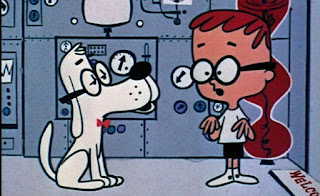Diet for Epilepsy: Simply MADness?
I mentioned in an earlier post that I’m participating in a year-long study of the Modified Atkins Diet (MAD) and epilepsy. You may wonder, how did the infamous Dr. Atkins and his infamous "fad diet" get connected with epilepsy? Excellent question, Sherman! Let’s jump in the Wayback Machine and find out.
Epilepsy has been documented in Western culture since ancient times. Folks back then had no idea what caused seizures (probably something simple like, ya know, demonic possession) but they did find that fasting seemed to prevent them. Fasting was used widely, by such famous healers as Hipporcrates (On the Sacred Disease) and even Jesus (Mark 9:29).
The problem is, you can only fast for so long. If Looney Tunes taught us anything, it’s that at some point, your best friend starts to look like a carved turkey, and then the whole relationship just goes south.
A breakthrough came in the 1920s, when physicians discovered that a low-carb, high-fat diet mimicked the effects of fasting, likely through the increase of ketones in the body. These ketones are used to power the brain (instead of its default fuel, glucose), and they make the brain less likely to seize. “Huzzah!” said the mustachioed old-timey gentlemen of science. The ketogenic diet was born.
For a while, this new diet was the go-to treatment for epilepsy, and it actually worked quite well. But before long, a number of medications hit the market that delivered the benefits of seizure reduction, without all the hard work of watching what you eat. “Huzzah!” said the doctors again. “Hooray for drugs!” Better living through science, and the ketogenic diet faded into obscurity.
The diet was re-discovered sometime in the 80s, though, when some doctors, frustrated by the fact that even the best medications only help about 50% of patients, dusted off the ol’ ketosis playbook, hoping that it could serve as a last resort for these desperate folks. Sure enough, it helped many people that drugs could not.
At around the same time, a rogue cardiologist named Robert Atkins was finding that — contrary to conventional wisdom — a low-carbohydrate, high-fat (LCHF) diet helped his patients to avoid heart disease and lose weight. He published a book, and the rest is, well, history.
Nowadays, Atkins and Keto and Paleo (along with a dozen other variations on the LCHF theme) are everywhere. As Americans become more and more obsessed with our weight, and more and more frustrated with the conventional (low-fat) dietary advice that’s made us obese, these diets have taken off. That’s how I happened upon the whole thing: I wanted to lose weight. Then when I learned about the benefits for my epilepsy, I was all in.
The clinic at Johns Hopkins uses the Modified Atkins Diet (MAD). It's slightly stricter than Dr. Atkins’s original, but less restrictive than the 1920s diet. It means eating real food, and including lots of fat, some protein, very few carbs. It took a while to get the hang of it, but I’ve actually found eating this way to be surprisingly easy and enjoyable, and I intend to stick with it long-term.
Still, within the neurology community, ketogenic diets like MAD are often seen as a “fringe” or extreme treatment. People are told by their doctors that they are not candidates for the diet, or that “we don’t do that around here.” The protocol, it seems, is: (1) Try every medication on the market (singly, then in various combinations) and (2) If that fails, try slicing out a piece of the patient’s brain, and (3) If that fails, then take a look at what they eat.
This to me is the real madness. Food is life, is it not? Maybe when we suffer from an illness, diet should be the first thing we look at, not the last. After all, drugs have side effects; healthy eating doesn't.
For me, I want to know that I’m doing all I can to ensure a long and healthy life. I don’t want to simply outsource my health to a big pharmaceutical company. If passing on the dinner rolls means becoming my best self, then sign me up. I’ll skip the stuffing and dig into the turkey. It’s a big responsibility, taking ownership of your own health, which may be why so many people shy away from it. But I’ll tell you that since I have, I’ve felt more powerful, more positive, more energetic and more passionate. I have more to give to my family, my work, and the world. And to me, that’s what really matters.
For me, I want to know that I’m doing all I can to ensure a long and healthy life. I don’t want to simply outsource my health to a big pharmaceutical company. If passing on the dinner rolls means becoming my best self, then sign me up. I’ll skip the stuffing and dig into the turkey. It’s a big responsibility, taking ownership of your own health, which may be why so many people shy away from it. But I’ll tell you that since I have, I’ve felt more powerful, more positive, more energetic and more passionate. I have more to give to my family, my work, and the world. And to me, that’s what really matters.
Note: The ramblings published on this blog are the opinions of the author alone and shared for entertainment purposes only. The author is an English major with no medical or scientific background; thus, his words should never be taken as medical advice. Consult with your doctor or medical professional before undertaking any diet or exercise program.





Comments
Post a Comment